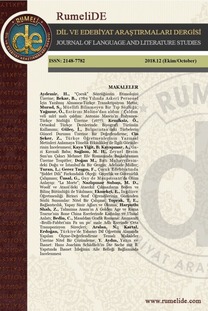Birleşik sözcüklerde vurgunun (ölçülebilir) görünümleri
Vurgu, temelde bir seslem üzerindeki soluk
baskısı olarak nitelendirilmektedir. Bununla ilgili teorik çalışmalar da bu
tanımı destekler nitelikler taşımaktadır. Bununla birlikte teknolojinin
gelişmesi sesbilim alanındaki tanımların ölçülebilir olmasını da sağlamıştır.
Ses analiz programlarının alınan seslerin ses yazımı ya da spektrogram
görüntüsünü sağlaması bu alanda çalışanlar için görülür bir veri sunmaktadır.
Bürün ögeleri içerisinde ölçümü en zor olan vurgunun yine henüz tam anlamıyla
görüş birliği bulunmayan birleşik sözcüklerdeki görünümleri çalışmanın konusunu
oluşturmaktadır. Türkçede birleşik sözcükler: sözcük öbeği, bileşik sözcükler
gibi adlarla da anılmaktadır. Çalışmada Türkçede sıklıkla kullanılan ve
üzerinde daha önce de metrik (ölçülebilir) çalışma yapılmamış birleşik
sözcüklerinseslendirilmesi, farklı yaş ve cinsiyete sahip anadili
konuşurlarından ses laboratuvarında alınmıştır. Kayıt altına alınan bu
sözcükler, cümleye bağımlı ve bağımsız olarakiki şekilde alınmıştır. Böylelikle
amaç konuşurun bu sözcükleri sadece sentaktik bir düzlemde aynı şekilde
semantik bir bütünlükle ortaya çıkarıp çıkarmadığını çalışmada
değerlendirmektir. Alınan bu ses kayıtları yine laboratuvar ortamında vurgu
görünümleri esasında Praat ses analiz programında değerlendirilmiştir. Çıkan
sonuçlara göre bir sözcük öbeğinin birleşik sözcük olarak değerlendirilmesi
için esas oluşturan fonolojik, sentaktik ve semantik birlikteliğin vurgu
bakımından görünümü de değerlendirilmiştir. Sentaktik yapı içerisindeki
birleşik sözcüğün tek başına semantik olarak söylenmesi vurgun yerini
değişitirip değiştirmemesi çalışmada incelenmektedir. Çalışma, ölçülebilir
vurgulara ait görünümleri (spektorgramları) uygulamalı bir çalışma içerisinde
incelemektedir.
Anahtar Kelimeler:
Vurgu, birleşik sözcükler, ölçülebilir vurgu
Views of emphasis (measurable) in compound words
Word stress is basically defined as a pale
pressure on a vowel. The theoretical studies related to the this subject
support the definition. However, the development of technology has made the
definitions in the field of phonology measurable. The fact that voice analysis
programs provide sound writing or spectrogram image of the received sounds
provides visible data for those interested in this field. The subject of the
study is the appearance of the most difficult word stress which is not yet
fully understood in the prosodic elements. In Turkish composite words are
referred by phrases, compound words etc. In the study, the vocalization of the
compound words which are frequently used in Turkish and have not been metricly
measured before, were taken from the native speakers of different ages and
genders in a voice laboratory. These words were recorded in two ways,
independent and dependent of sentence. Thus, the aim of this study is to
evaluate whether or not the speaker produces these words on a syntactic plane
in the same way with a semantic integrity. These sound recordings were again
evaluated in the Praat sound analysis program on the basis of word accent views
in a laboratory condiditons. According to the results, the appearance of
phonological, syntactic and semantic association which is the basis for
evaluating a phrase as a compound word was also evaluated in terms of emphasis.
The semantic singing of the unified word in the syntactic structure is examined
in the study. The study examines the
views (spectrograms) of measurable word accent from a theoritical aspect and
their status in an applied one.
Keywords:
Stress, compundwords, metricalstress,
___
- Aktaş, E. (2015). Türkçe Alıntı Sözcüklerde Vurgu Görünümleri. Yayımlanmamış Yüksek Lisans Tezi. Ankara: s.4. Banguoğlu, T. (1959). Türk Grameri Birinci Bölüm Sesbilgisi. Ankara: TDK. Bolınger, D. (1958). Stressand Information. American Speech. Sayı: 33. 5-20. Çürük, Y. (2017). Türkçede Birleşik Sözcükler (İsimler). Yayımlanmamış Doktora Tezi. Ankara. Demircan, Ö. (1975). “Türk Dilinde Vurgu, Sözcük Vurgusu”.Türk Dili, s.284-290. Demircan, Ö. (1977). “Bileşik Sözcük ve Bileşik Sözcüklerde Vurgu”.TDAY-Belleten, s.263-275. Ergenç, İ. (1989). Türkiye Türkçesinin Görevsel Sesbilimi. Ankara: Engin Yayınları. Ergenç, İ. (2002). Konuşma Dili ve Türkçenin Söyleyiş Sözlüğü. İstanbul: Multılingual. Hayes, B. (1995). Metrical Stress Theory Principles and Case Studies. London and Chicago: The Unıversity Of Chicago Press. Klatt, D. (1975). “Vowel Lengthening is Syntactically Determined in a Connected Discourse,” Journal of Phonetics 3, 129-40. Levi, S. (2002). Intonation in Turkish: the realization of noun compounds and genitive possessive NPs. Ms. University of Washington. Özsoy, S. (2004). Türkçenin Yapısı-I Sesbilim. İstanbul: Boğaziçi Yay. Peterson, G. E. (1958) “SomeObservations on Speech," QuarterlyJournal of Speech 44, 402-12 Stetson, R. H. (1928).Motor Phonetics, North Holland, Amsterdam. [2nd edition 1951; republished 1988 withcommentaryby J. A. Scott Kelsoand Kevin G. Munhall, Little, Brown and Company, Boston.] Üçok, N. (1951).Genel Fonetik. Ankara: Multilingual. Wightman, C,vd. (1992) “Segmental Durations in theVicinity of Prosodic Phrase Boundaries,” Journal of the Acoustical Society of America 91,1707 -17.
- ISSN: 2148-7782
- Yayın Aralığı: Yılda 6 Sayı
- Başlangıç: 2014
- Yayıncı: Yakup YILMAZ
Sayıdaki Diğer Makaleler
Dünya edebiyatı ve izdüşümü: “Tercümedya”
Cerrah Mehmed’in tıbba dair risalesi
Birleşik sözcüklerde vurgunun (ölçülebilir) görünümleri
İngiliz sahnesinde gençlik şiddeti- suratına tiyatro
Türkçe öğretmeni adaylarının Türkçedeki alıntı sözcükler hakkındaki görüşlerinin incelenmesi
Etkinliklerle çocuk edebiyatı yapıtlarının Türkçe öğretiminde kullanılması
Hint üslubunda yabancılaştırma
Şeyh Süleyman Efendi ve “Lugat-i Çağatay ve Türkî-i Osmânî”ye tanık olarak katkıları
بازتاب واقعه عاشورا و قيام امام حسين(ع) در اشعار فارسی: از قدرت يابی صفويه تا دوران معاصر
